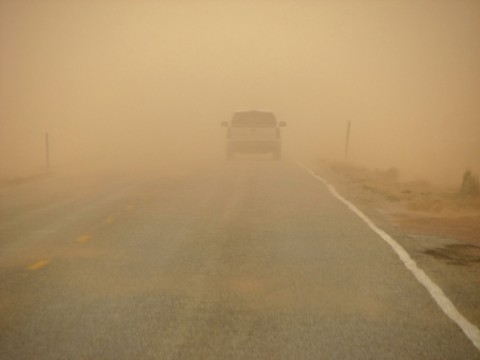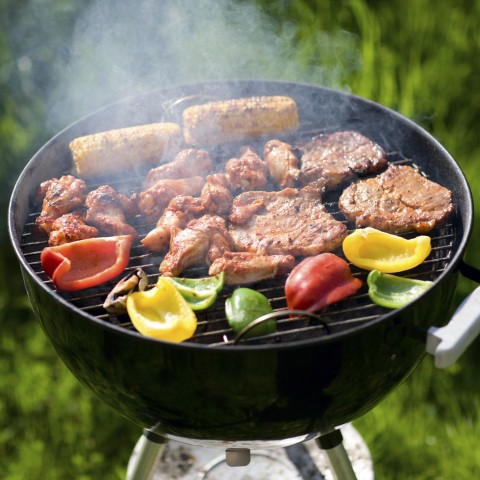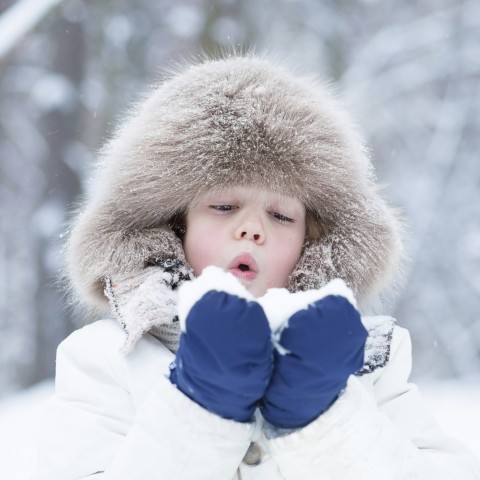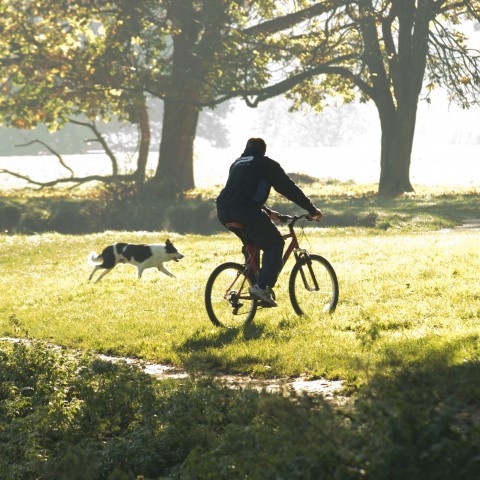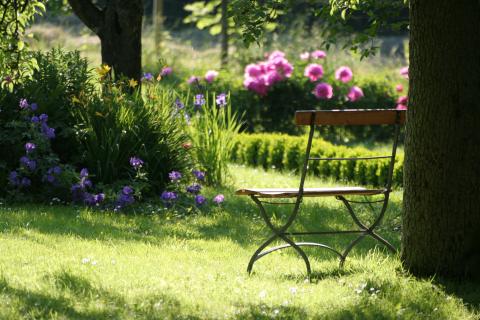Talking about the weather is just about universal. It’s a topic used to make small talk, divert from more serious topics or situations, and even express joy or annoyance. Weather is physical and natural, can evoke emotion and memories, and is one of the most convenient topics to be able to talk about in a pinch. Not only that, but the weather is often used in more creative contexts, such as metaphors and expressions.
By knowing how to describe the weather in English, you really are opening doors to many conversations. Consider this your U.S. weather radar on weather phrases in English and much more! By the time you’re through with this article, you’ll be able to talk about all types of weather in English!
EnglishClass101.com hopes to make expanding your weather vocabulary both fun and insightful for you!
Table of Contents
- Phrases and Words about Weather in English
- Temperature and Seasons in the United States
- How to Form Sentences about Weather in English
- Common Ways to Comment on the Weather
- Idioms Related to Weather in English
- Creative and Literary Use of Weather & Seasons
- Conclusion
1. Phrases and Words about Weather in English
Here are some weather words in English you should know to talk about U.S. weather. These words are the most common types of weather in English you’re likely to experience. We’ve also included explanations below these words to give you a better idea of what they mean.
1- Basic
There are many different types of weather in English that you can talk about and experience. Here are the basics:
- Sun (Sunny)
- It’s considered “sunny” when the sun is out, and there are no (or few) clouds.
- Cloud (Cloudy; Cloudless)
- It’s considered “cloudy” when there are many clouds in the sky.
- It’s considered “cloudless” when there are no clouds in the sky.
- Rain (Rainy)
- Any time that it’s raining, the weather can be described as “rainy”.
- Drizzle
- A “drizzle” means that it’s raining, but only lightly.
- Sprinkle
- When it’s “sprinkling,” it’s similar to when it’s drizzling.
- Hail
- “Hail” is when icy balls fall from the sky in cold weather, usually when it’s humid but not cold enough to snow.
- Sleet
- “Sleet” is similar to hail but is formed differently and usually occurs in the winter.
- Snow (Snowy)
- It’s considered “snowy” either when it’s snowing or when there’s a lot of snow on the ground.
- Breeze (Breezy)
- A “breeze” is a light wind.
- It’s considered “breezy” when a light wind is ongoing.
- Wind (Windy)
- “Wind” occurs when air is blown forcefully.
- It’s considered “windy” when the wind is ongoing or is considerably strong.
- Fog (Foggy)
- “Fog” is a layer of clouds that come down very near (or even touching) the ground.
- It’s considered “foggy” whenever this fog is noticeable or particularly thick. Oftentimes, foggy weather makes it difficult to see very far in front of you and is a bad weather condition to travel in.
- Frost (Frosty)
- “Frost” is a very thin layer of ice.
- Something is considered “frosty” if it’s covered in a thin layer of ice.
- Ice (Icy)
- “Ice” is frozen water. In terms of weather, ice usually refers to a body of water that has frozen over or rain/snow that has frozen over something (like a road).
- Something is considered “icy” if it’s covered in ice.
- Gloomy
- “Gloomy,” while not a technical weather term, refers to weather that’s not generally pleasant. This usually means cloudy, rainy, overcast, or cold.
- Overcast
- When the weather is described as “overcast,” it means that clouds (usually dark rain clouds) are covering the sky. This is the type of weather you’re most likely to experience if you visit a state like Washington or Oregon!
Once you have these words down, you’re ready to bring up the weather in English conversations — the perfect ice-breaker.
2- Storms and Natural Disasters
When talking about weather in English, it’s important to know terms for harsher weather too. Here’s some practical vocabulary for extreme weather events in English.
- Thunder
- “Thunder” is the loud sound that happens during thunderstorms and is the result of a lightning strike forcing the air around it to expand.
- Lightning
- “Lightning,” which occurs most often during a thunderstorm or other nasty weather, is a streak or flash of electricity in the air.
- Thunderstorm
- A “thunderstorm” is a type of weather condition characterized by dark, thick clouds, rain, lightning, and thunder. Thunderstorms range in severity, with some being very mild and short-lived and others being heavier and more dangerous.
- Snowstorm
- A “snowstorm” is characterized by a heavy snow and is usually accompanied by strong winds.
- Blizzard
- A “blizzard” is a severe snowstorm and is often considered dangerous.
- Tornado
- A “tornado” is defined as air that’s rotating in a violent motion and touches both the ground and the base of a cloud.
- Microburst
- A “microburst” is similar to a tornado, though it moves differently. Microbursts typically occur during serious thunderstorms.
- Dust/sandstorm
- “Dust storms” and “sandstorms” are common in drier areas of the United States. These events occur when the wind picks up dust or sand from the ground and blows it into the air in a large gust.
- Hurricane
- A “hurricane” is a large storm that occurs over water, especially in more tropical regions.
3- Words to Describe Temperature
Here’s a final list on weather and climate in English. This should give you a better idea of how to describe the weather in English based on temperature and humidity.
- Warm
- The temperature is considered “warm” when the temperature is high but not too high.
- Hot
- The temperature is considered “hot” when the temperature is very high.
- Cool
- The temperature is considered “cool” when the temperature is low but not too low.
- Cold
- The temperature is considered “cold” when the temperature is very low.
- Chilly
- If the weather is “chilly,” it means that it’s pretty cold.
- Humid
- “Humid,” in and of itself, is not a temperature; however, it does affect how the temperature is perceived. If it’s “humid,” it means that there’s a lot of moisture in the air.
- Dry
- “Dry” is another word that doesn’t represent an actual temperature, but it affects how the temperature is perceived. If it’s dry, there’s no (or very little) moisture in the air.
- Scorching
- “Scorching” means that it’s excessively hot and usually very dry. You may hear this word used often when talking about a desert.
- Roasting
- “Roasting” means that it’s very hot. This word can be used to describe both dry and humid heat. It’s often said in exaggeration when someone is uncomfortable because of the heat.
- Freezing
- When it’s “freezing,” this can mean one of two things: 1.) It’s actually freezing, meaning that the temperature is below thirty-two degrees Fahrenheit (zero degrees Celsius), or 2.) It’s just very cold.
- Crisp
- “Crisp” is used to describe temperature that’s both cool and refreshing. This word is most often used to describe the temperature during autumn.
2. Temperature and Seasons in the United States
The weather and temperature in the United States varies by region, and people experience the changing of seasons differently depending on where they live. In this section, we’ll go over what to expect in U.S. weather forecasts by season and region.
If you want a more accurate and in-depth look at this, you can also view a U.S. weather map online or check in to the U.S. Weather Service. You can also use a U.S. weather radar map before your trip to have a better idea of what to expect, or you can keep tabs on a U.S. weather forecast channel.
Keep in mind that there are four general “regions” of the United States. Before we delve into seasonal information, here’s a quick rundown of which states belong to which region:
Midwest:
- Illinois
- Indiana
- Iowa
- Kansas
- Michigan
- Minnesota
- Missouri
- Nebraska
- North & South Dakota
- Ohio
- Wisconsin
Northeast:
- Connecticut
- Maine
- Massachusetts
- New Hampshire
- New Jersey
- New York
- Pennsylvania
- Rhode Island
- Vermont
South:
- Alabama
- Arkansas
- Delaware
- Florida
- Georgia
- Kentucky
- Louisiana
- Maryland
- Mississippi
- North & South Carolina
- Oklahoma
- Tennessee
- Texas
- Virginia
- West Virginia
West:
- Alaska
- Arizona
- California
- Colorado
- Hawaii
- Idaho
- Montana
- Nevada
- New Mexico
- Oregon
- Utah
- Washington
- Wyoming
With that out of the way, let’s take a look at the seasons in the United States as well as more weather and climate information in English. Be sure to keep your eyes peeled for some of the weather words in English we went over in the previous section!
1- Spring
1. When is Spring?
In the United States, spring officially begins on March 20 or 21, whichever day the Vernal Equinox takes place on and ends on the summer solstice, which is usually June 21 (but can also take place on June 20 or June 22).
2. Basic Attributes of Spring
Spring in the United States is known as the time of year when winter comes to an end. It’s when (most) people rejoice over the warmer days to come and all of nature returns to life. Flowers bloom, trees begin budding and sprouting leaves, and hibernating animals return from hibernation. The snow and ice begin to melt, and it snows less frequently in most places.
Spring is also a trying season for those with allergies, as they’ll once again have to suffer through the first few weeks of new pollen in the air. Overall, Americans seem to love and appreciate springtime for all of its good qualities.
3. Spring Around the U.S
Midwest: Here, you can expect to see some rain during the spring.
Northeast: This is another region of the U.S. where you can expect to see some rain during spring.
South: Spring in the south is generally a time for nice weather, though it will rain in most southern states as the weather warms up.
West: When it comes to the west, the weather tends to vary in the northwest and southwest. For instance, spring is generally rainy in states like Washington and Oregon, while states like Arizona and New Mexico are much drier.
2- Summer
1. When is Summer?
In the United States, summer typically begins on June 21, though it can begin on June 20 or June 22. It ends on the autumnal equinox, which takes place in late September (anywhere from September 21 to September 24).
2. Basic Attributes of Summer
Across the U.S., summer is known as being the warmest season. The days are longer, the temperatures rise, and most states get to see the sun more often! Summer is also generally considered a season of fun and freedom —schools across the country observe their summer break, and the longer days and added sunshine significantly improve people’s moods (especially in states that don’t usually see a lot of sunshine!).
This is usually the season when families and individuals like to travel, take vacation time from work, and spend lots of time outdoors. For the best summer experience, though, make sure to check a U.S. weather radar or a U.S. weather map to ensure the weather will be nice during your visit.
3. Summer Around the U.S.
Midwest: Summer in the midwest can be described as warm, but do keep in mind that summer may bring thunderstorms and rain.
Northeast: While the northeast tends to be cold most of the year, it does warm up quite a bit in the summer.
South: The south is generally known for having nice summer weather, despite some rainstorms.
West: Again, northwest and southwest weather conditions vary. In the northwest, it rarely gets very hot in the summer; it’s what most Americans consider “perfect weather.” The southwest tends to get hotter during summer and is also drier.
3- Fall/Autumn
1. When is Autumn?
Autumn begins on the day of the autumnal equinox, which is anywhere from September 21 to September 24. It ends on the day of the winter solstice, which is on December 21 or December 22.
2. Basic Attributes of Autumn
In general, autumn tends to be a mild season in terms of weather and temperature. It’s best known as the time of year when the leaves change color and eventually fall to the ground. The weather begins to cool down after the heat of summer, and days gradually get shorter again.
Many people perceive autumn as a season of coziness, a time to enjoy the cool weather and lovely scenery, before snuggling up inside with family, friends, or a book. In the United States, there’s another common element of autumn: the Pumpkin Spice Latte at Starbucks arriving once again!
3. Autumn Around the U.S.
Midwest: The dryness of the midwest continues into autumn, with generally mild weather.
Northeast: This is a good region of the U.S. to go looking at autumn leaves on the trees, especially in areas that are more tree-dense. The overall weather is mild.
South: Many states in the south are known for having nice autumn weather and a lengthy autumn season.
West: Autumn in the west is generally nice—most years, it isn’t too hot or too cold. There are also many places here that are great for looking at autumn leaves; having lived in both Colorado and Washington, I can vouch for these being two states with lovely autumn scenery.
4- Winter
1. When is Winter?
Winter begins on the winter solstice, which takes place on either December 21 or December 22. It ends on March 20 or March 21, the beginning of spring.
2. Basic Attributes of Winter
Across the United States, winter is known as the coldest season and is often associated with snow, ice, and frost. Even for those states that rarely get snow, temperatures drop and the weather tends to become glum. This is also the season when the days are shortest and the least amount of sunlight is available. But to offset this gloominess and coldness, winter is also when Christmas and New Year’s take place!
Again, using a U.S. weather radar map to ensure that your winter visit will be pleasant and safe is advised! Further, the U.S. Weather Service may alert you to any hazardous weather, so do take heed of its advice.
3. Winter Around the U.S.
Midwest: The midwest is pretty notorious for very cold winters with lots of snow.
Northeast: This region of the U.S. also gets a lot of snow during the winter and may have some of the worst winters in the country. If you don’t like the cold, this is probably not the region for you.
South: The majority of the south doesn’t have very bad winters. They tend to be short and sweet.
West: When it comes to the west, the northwest tends to be a little bit colder than the southwest, though neither region usually has bad winters. The west typically experiences mild winters with a few snowstorms (depending on the year).
3. How to Form Sentences about Weather in English
Here, we’ll go a little bit more into how to describe the weather in English using common sentence patterns and weather phrases you’re likely to hear. These are phrases you can use in just about any conversation about weather in English!
Small Talk: Commenting on the Weather
- “It’s [adjective] today.”
- “It’s [warm] today.”
- “It’s [number] degrees.”
- “It’s [59] degrees.”
- Note that in the United States, we use Fahrenheit instead of Celsius to measure temperature!
- “This [season] has been [adjective].”
- “This [winter] has been [long].”
- “It’s such a(n) [adjective] day!”
- “It’s such a [gloomy] day!”
- “Isn’t the weather [adjective] today?”
- “Isn’t the weather [chilly] today?”
- “I [like/love/don’t like/hate] this weather.”
- “I [don’t like] this weather.”
- “This weather makes me feel [emotion].”
- “This weather makes me feel [blue].”
- Note: Feeling “blue”? Later in this article, we’ll go over an expression called “the winter blues” to help you better understand what this means.
- “It’s so [adjective – usually temperature-related]!”
- “It’s so [hot]!”
- “[Type of weather] is predicted for the next week.”
- “[Rain] is predicted for the next week.”
- People in the United States definitely like to be ahead of the weather by using U.S. weather forecast apps and U.S. weather maps!
Asking about the Weather in English
There are a few basic ways to ask about the weather in English.
- How’s the weather?
- What’s the weather like?
- What’s the weather forecast for [day or time frame].
- “What’s the weather forecast for [tomorrow]?”
- “What’s the weather forecast for [next week]?”
4. Common Ways to Comment on the Weather
In this section, we’ll go over sentences about weather in English based on the season. By the end of this section, you should have a few good phrases to describe the weather in English under your belt!
1- Spring
Spring weather conversations often have to do with joy over winter ending and an appreciation for the warmer weather and all the things that come with it (flowers, animals, people being in a better mood, etc.). Here are some examples of weather phrases in English you may hear in a conversation about spring or things you can say.
- “I’m so glad winter is over!”
- “I’m so glad that spring is finally here.”
- “It’s nice out today.” or “Isn’t it nice out today?”
- “It’s so beautiful outside.”
- “I enjoy this weather.”
- “I look forward to summer.”
- “That breeze feels nice.”
- “It looks like rain is coming.”
Do note that everyone’s perception of springtime is different, and not everyone will be glad that winter is over or enjoy the qualities of spring. In these cases, you may hear the opposite of some of these phrases (“I’m upset that winter is over,” “I look forward to winter,” etc.).
2- Summer
Summer is the warmest season all across the U.S., and many comments and conversations have to do with the heat. Here are some good phrases to describe the weather in English during the summer.
- “It’s so hot today!”
- “It’s so humid/dry.”
- As mentioned earlier, each region of the United States experiences the seasons differently. Some states have a very humid summer (like Texas) and some have a very dry summer (like Arizona).
- “Drink plenty of water/fluids!”
- “Let’s do something today!”
- “Let’s turn up the AC (air conditioning).”
- “I’m roasting!” or “It’s roasting!”
- Here, the first statement means that the person speaking is feeling very hot, while the second statement indicates that the temperature itself is hot.
- “I can’t believe how hot it is.”
- “I like having longer days again.”
- “Bugs are the only thing I don’t like about summer.”
- With warm weather comes more creepy-crawlies, both outside in their homes and inside of our homes.
- “I’ll never complain about winter again.”
- People are quite funny sometimes. When we become desperate to escape the heat of summer, we finally see the good in winter. We say things like this even though we know we will complain about the winter when its turn comes.
3- Fall/Autumn
During autumn, comments about the weather overall tend to be more mild/neutral than during any other season, probably because the weather tends to be the most mild for many U.S. states. Most comments have to do with the leaves changing, as well as the gradual weather/temperature fluctuations that happen during this season. (Autumn also marks the beginning of what I call “the holiday season,” when several big holidays take place throughout autumn and winter up until the new year. Many comments during this season have to do with the holidays.)
- “The weather is nice today.”
- “The leaves are so pretty.”
- “That’s a pretty cold breeze.”
- “I hope it’s not too cold on Halloween.”
- “I hate needing to rake leaves.”
- “I enjoy crunching the leaves under my feet.”
- “This time of year is [adjective].”
- Here, the adjective used to describe autumn will vary depending on who you’re talking with. If it were me, I might say, “This time of year is [peaceful].” Other adjectives may describe the temperature or something else unique to the season.
4- Winter
Winter is the coldest season, and thus weather-related comments usually have to do with the cold temperature and related weather conditions.
- “It’s so cold today!”
- “I can’t believe how cold it is.”
- “I’m freezing!”
- “It’s chilly out today.”
- “Let’s go inside and warm up.”
- “I should have brought a jacket/coat.”
- “The snow is so pretty.”
- “The roads are too icy to drive on.”
- Checking in with a U.S. weather radar map and paying attention to any U.S. Weather Service alerts can be helpful in avoiding (or preparing for) a situation like this.
- “They canceled school because the roads are too dangerous.”
- “Let’s play in the snow,” or “Let’s [snow-related activity].”
- Depending on where you are in the United States, winter may be a good time to enjoy participating in (or watching) various snow- or ice-related activities. Some of these include sledding, skiing, snowboarding, ice skating, and making snowmen.
- “I hope it warms up soon.”
- “I can’t wait until spring/summer.”
- “I’ll never complain about summer again.”
5. Idioms Related to Weather in English
Now that you know the basics of talking about weather in English, it’s time to look at some idioms.
Oftentimes, people use sentences about weather in English that have another meaning. Here are a few of the most common weather English idioms for you to review and practice while you expand your weather vocabulary!
1- “It was a breeze.”
Meaning:
When someone says that doing something “was a breeze,” it means that it was very easy or simple to do.
Example:
A: Congratulations on passing your exam!
B: Thanks! It was a breeze!
2- “A sunny disposition/attitude.”
Meaning:
When someone is said to have a “sunny” disposition or attitude, it means that they’re either cheerful or kind and amiable (and oftentimes both).
Example:
A: I wish I was more like Shay.
B: I know, me too. He has such a sunny disposition.
3- “Winter blues.”
Meaning:
When you or someone you know has the “winter blues,” it means that you’re feeling sad or depressed due to the winter season. It’s similar to feeling “blue” or sad, but it’s specific to winter. The cold weather, lack of sunshine, and shorter days are often associated with depression.
Example:
A: What’s wrong, honey?
B: I don’t know. I think I just have the winter blues.
4- “Spring fever.”
Meaning:
“Spring fever” can have two meanings, both closely associated. The first, and most common, meaning of “spring fever” is a happiness and joy for winter ending. Just like winter tends to cause depression, spring does the opposite! The second meaning of “spring fever” is a heightened sexual desire or a deeper romantic feeling, also associated with the end of winter and the beginning of spring.
Example:
A: You seem happy today. Must be spring fever!
B: That’s probably it.
5- “After/beyond the storm.”
Meaning:
In this phrase, “the storm” typically refers to something negative, whether it be a difficult time in someone’s life or general negative feelings. When someone talks about “after” or “beyond” the storm, it means that the hardship or bad situation is over.
Example:
A: I finally found another job.
B: I’m so glad to hear you’re beyond the storm now.
6- “Calm before the storm.”
Meaning:
Once again, “the storm” refers to something negative. Oftentimes when it comes to the weather, there will be a period of good weather and tranquility right before a storm or other bad weather hits. This phrase indicates that while things are calm now, a bad time or situation can be expected in the near future.
Example:
A: Life was going so great, but I guess it was just the calm before the storm.
B: I’m sorry to hear about that.
7- “Under the weather.”
Meaning:
When someone is “under the weather,” it means that they aren’t feeling well. Usually, this indicates that they’re sick, but it can also refer to being emotionally unwell.
Example:
A: I can’t come in to work today. I’m feeling a bit under the weather.
B: Okay. Get well soon.
8- “Rain on someone’s parade.”
Meaning:
This is an interesting phrase to use, and one of my favorites. Imagine watching a parade go down the street (or being in one yourself) and then needing to call it quits early because it started raining badly. When you “rain on someone’s parade,” it means that you’ve ruined their fun or taken away from an experience that was supposed to be good for them.
Example:
A: This was the worst birthday ever. She totally rained on my parade!
B: I know. I’m sorry about that.
9- “Weather a storm.”
Meaning:
“Weather a storm” sounds confusing at first. Keep in mind that the weather referred to here means “come safely through” and doesn’t refer to weather as in temperature or weather conditions. And once again, the “storm” refers to something negative. So, when you “weather a storm,” it means that you’re going through a hard time and will make it out okay.
Example:
A: I feel like my life is falling apart.
B: I think you just need to weather the storm. It’ll be okay.
10- “Biting cold.”
Meaning:
When someone refers to “biting cold,” it basically means “extremely cold.” While a temperature can’t actually “bite,” it can be cold enough that it hurts exposed skin like a bite would. Some people also use the term “nipping cold,” which means the same thing.
Example:
A: Tamara made it through the biting cold just fine.
B: Good for her. I could never do that.
11- “(S)he’s so cold.”
Meaning:
When used figuratively, saying that someone is “cold” usually means that they’re distant or show little emotion, especially to the point of appearing rude or standoffish.
Example:
A: Me and my mother don’t have much of a relationship. She’s very cold.
B: That’s how my relationship with my brother is.
12- “An icy stare.”
Meaning:
When someone refers to “an icy stare,” icy can usually be replaced with “mean” or “distant.” It’s the kind of stare that might make you feel cold or uncomfortable or give you a “bad vibe” in general.
Example:
A: Did you see that icy stare she was giving him?
B: I did! I wonder what that was about.
13- “Cold-hearted.”
Meaning:
If someone is “cold-hearted,” it means that they appear either emotionless or selfish/mean.
Example:
A: I think her husband is very cold-hearted.
B: Well, maybe give him another chance. I heard he’s shy.
14- “A hot temper.”
Meaning:
When someone has a “hot temper,” it generally means that they either get angry very easily or that they act out when they’re angry. Oftentimes, it means both. If someone warns you that another person has a hot temper, take heed and be careful not to offend or hurt them.
Example:
A: I think I’ll say hello to Tom’s wife.
B: Be careful, I hear she has a hot temper.
15- “Hotheaded.”
Meaning:
“Hotheaded” means about the same thing as “hot tempered,” though it can also refer to a sense of stubbornness and pride along with the anger.
Example:
A: Valerie’s daughter is pretty hotheaded, don’t you think?
B: Not as bad as me at her age!
16- “Blue/clear skies.”
Meaning:
When it comes to weather in the United States, most of us love clear blue skies! When someone refers to blue or clear skies (outside of actually talking about the weather), it refers to something good or positive. One common phrase associated with this is “clear skies ahead,” which means that things will be good from that point on.
Example:
A: This was a tough semester.
B: Yeah, but it should be clear skies ahead from now on.
6. Creative and Literary Use of Weather & Seasons
Talking about the weather isn’t limited to small talk.
Oftentimes, weather and seasons are used in a literary sense as a way of making a metaphor/simile, creating an image in someone’s mind or evoking specific emotions. For example, in literature and poetry, people often compare the changing of seasons with the changes of life itself (and even use phrases like “seasons of life” to describe these changes).
Spring is often associated with birth and life, or even happiness itself. While autumn and winter tend to represent death or misery. Just as winter changes to spring, from death comes life, and from sadness comes happiness; and vice-versa. This is a common theme when it comes to weather in literature.
People can also use words related to seasons and weather to evoke emotions or even nostalgia, such as using positive words associated with summer to remind someone of summers of the past. This is especially true in terms of imagery and appealing to the senses.
Another example of weather terms in literary use is the name of the fictional character “Jack Frost,” whose last name indicates who he is (a representation of winter and the cold) and what he does (freezing things over, etc.).
Weather talk is often used in poetry and other forms of writing for these reasons and can enrich writing and conversation greatly.
7. Conclusion
Now that you know some weather words in English, good phrases to describe the weather in English, and more information on weather in the United States, you should be more equipped for small talk and bigger-picture conversations during your stay here. We hope you enjoyed expanding your weather vocabulary with us, and that you learned enough about U.S. weather to make an informed decision about your stay or visit.
Is weather talk similar in your own country to that in the United States? What sort of weather phrases do you use there, and which of these sentences about weather in English do you feel ready to try out in a conversation? Let us know in the comments!
If you want to learn even more about United States culture and English, visit us at EnglishClass101.com and see all that we have to offer. From free vocabulary lists to insightful blog posts on various topics, there’s something for every English learner. You can also use our online community forum to discuss lessons with fellow English learners or create a Premium Plus account to take advantage of our MyTeacher program!
We’re excited for your English-learning journey and all the places it’ll take you—and we’re even more delighted that you’re here! Know that your hard work will pay off; before you know it, you’ll be speaking English like it’s your native tongue, and we’ll be here every step of the way there. Best wishes!





